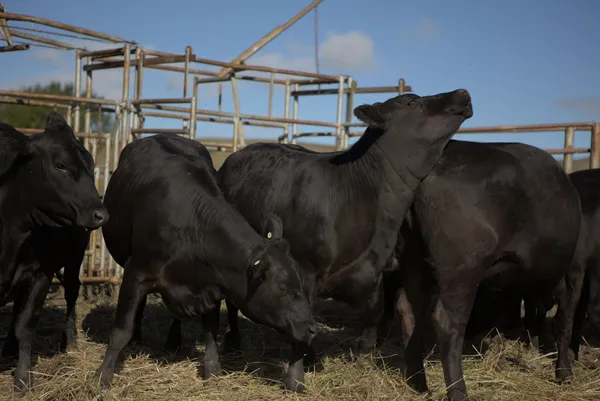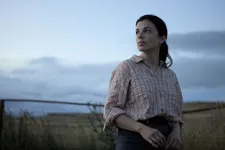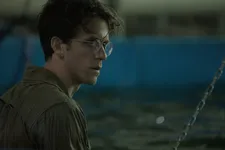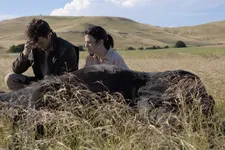 |
| In Vitro Photo: courtesy of Strike Media |
Every now and again one comes across a film which offers lots of interesting potential talking points but is reliant on a twist that makes a straightforward interview impossible. That’s very much the case with In Vitro, directed by Will Howarth and Tom McKeith, and co-written by Talia Zucker. Talia stars as Layla, opposite Ashley Zukerman as her husband Jack – a couple who live on an isolated farm in a future where food supplies are under threat and new methods of production are being explored. Will and Talia joined me in the run-up to the film’s screening at the Glasgow Film Festival and we did our best to work around the elephant in the room so that we could explore other aspects of the filmmaking process.
“Talia had the original idea for the film, this sci fi concept that focused around a couple living on an isolated property, developing new technology and new ways to breed animals in a barren future,” says Will. “That was the core idea, I guess, at the beginning, and we just kept pulling on it and went from there.”
 |
| Talia Zucker as Layla in In Vitro Photo: courtesy of Strike Media |
We talk about the challenges of world-building in such a sparse setting.
“A lot of it was also in the script. We worked for a long time to fine tune what the world would be. A lot of those little pieces were in the script already and we kept building on that, but the location was pretty significant for this film. Finding that very specific spot that had the mood and the feel of what we wanted was really integral to the process, I'd say.”
“Yeah,” says Will. “We wanted that location to not feel outwardly Australian, because I think audiences are very familiar with the red dirt and really burnt out, harsh Australian environment, especially made famous by Mad Max and films like that. So we wanted to do something that felt a bit more like it could be anywhere and something that also had a bit of a natural eeriness and danger to the landscape. But in terms of how we came up with what the future was, I guess the technology that would speak to what future it was, it was actually a really fun exercise. With our designer, Alexi Wilson, we ended up going backwards rather than forwards. We used a lot of throwback technology.
“We thought that it was more interesting rather than a super futuristic kind of sci fi with polished white plastic and chrome and this robotic stuff. We wanted it to feel like a future where the world was breaking down and people had to repurpose old technology. I think that was a really good idea that our production designer came up with. She just had very good ideas about how we could use old stuff to create a future world.”
“We visited a cattle cloning farm outside of Melbourne, sat down with a farmer and had, a big discussion about his work,” says Talia. “It was really interesting.”
“Talia and I did that trip during the script process,” adds Will. “This was just a property outside of Melbourne, Australia, where they were already cloning cattle and looking at new ways of breeding and how to meet demand or replicate the right type of meat. We were blown away by how normal it all was. It was essentially like a guy on an everyday farm with a bit of a lab to the side. I thought ‘Wow this is crazy.’”
It was important to them that the set-up in the film should feel real and relatable, Talia says.
It's a first feature for both Will and Tom as directors. I note that they’ve done just about everything that I would normally advise people to do on a first feature in terms of having a small cast and a location where they could take their time a bit. Did they construct the film with that in mind or did it just work out that way?
“It was definitely top of mind,” says Talia. “When we were developing the project, we wanted a minimal cast, minimal locations, just to make it more achievable. I'm not sure if in the end it was, though. We had cattle and we had a kid, and there were elements that made it pretty challenging because it was so remote. Everything had to be brought to these locations that were pretty far away.”
 |
| Ashley Zukerman as Jack in In Vitro Photo: courtesy of Strike Media |
“Our key property is actually set over multiple different properties,” Will explains. “It's very hard to find that one hero location that has everything you want, with an animal breeding facility as well as a particular landscape that we wanted. So yes, we set out with the intention to make something contained and achievable – also because we like those sorts of contained, psychologically driven sci-fis and thrillers.”
It’s an approach that puts the focus on the central characters’ relationship. There's a lot of odd stuff going on there. I mention that I love the opening shot where we see them lying in bed together and the way that his arm is around her looks uncomfortably possessive. Was that intentional?
“It was,” says Will. “It's funny, we didn't give Ash that direction, so it was written that he was lying in bed with her. But, you know, as often happens on set, the actor brings something that you didn't think about. We were reviewing the film and we saw that what maybe at first glance looks like a loving embrace looks quite firm and like he's got a real grip on her. And so, yeah, I would love to say ‘Oh, yes, that's exactly what I wanted,’ but he offered up that idea, and when we reviewed it back, we thought it was a really good way to open the film.”
We talk about the other ways that they approached showing viewers the unease in that relationship, without giving too much away.
“I'm not sure we fully knew how far we were going to push it,” says Talia. “Even in the filming, Will and Tom would often kind of give us different direction, give us lots of options as far as how the scenes could play out. We weren't entirely sure how far we wanted to push that sort of controlling, coercive control relationship stuff. Is that fair to say?”
“Yeah, yeah, it's exactly right,” says Will. “And that was a real challenge in the edit, actually, to go ‘How much do we want to turn up the dial on something being wrong, or how much do we want it to simmer in this kind of mood where the audience is slowly getting onto it?’ But like Talia said – and luckily Talia is very willing to do this on set – Tom and I would often get a range. So it means in the edit, we can say ‘Okay, we want to get a bit more of a glimpse internally at this moment, or actually, we don't want to be able to read too much here.’”
I tell them that I like the fact that the film is quite sympathetic to Jack in a way, without excusing his behaviour. We do see that he's hurting and we see what he's trying to achieve.
“I think what you just said is exactly what was on our mind, particularly in relation to Jack,” says Will. “I think if you're presented with a character who's just a crazy person or someone you can write off as a nasty psycho or something like that, you lose both sides of the story, and then you lose the opportunity to dive into some potentially more interesting themes. So we did want to make Jack's character complex in that he is certainly hurting in the situation as well. I think Layla is possibly easier to empathise with.”
 |
| Ashley Zukerman and Talia Zucker in In Vitro Photo: courtesy of Strike Media |
Were they aiming to use the relationship as a microcosm of the disintegration of the wider world?
“I don't think that was the intention early on,” says Will. “We just had this relationship and core idea and those things naturally came about. The outside world was probably something that came in a little bit later because you go ‘Ah, okay, they're on an isolated property, the world is breaking down. What does that look like? What's the technology?’ It just kind of naturally progressed. I think in the same way, themes naturally arise from that original idea. So we didn't sit down and say, ‘Hey, let's write a film about love and coercive control,’ or ‘Let's do a film that touches on some troubling ideas around domestic violence,’ but then you've got this concept that naturally speaks to it, I think, and those ideas come out and you just keep kind of pulling on the thread and then suddenly get to explore these other interesting things.”
They’re thrilled to have the film screening in Glasgow, they say, and if it weren’t for their new baby, they would definitely be there in person. Perhaps another year.





















